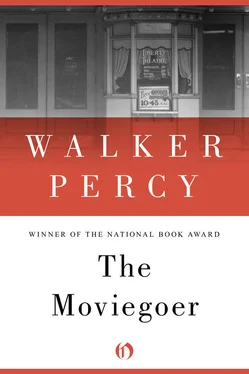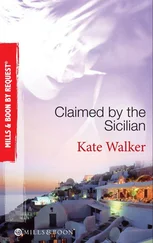Walker Percy - The Moviegoer
Здесь есть возможность читать онлайн «Walker Percy - The Moviegoer» весь текст электронной книги совершенно бесплатно (целиком полную версию без сокращений). В некоторых случаях можно слушать аудио, скачать через торрент в формате fb2 и присутствует краткое содержание. Год выпуска: 2011, Издательство: Open Road Media, Жанр: Современная проза, на английском языке. Описание произведения, (предисловие) а так же отзывы посетителей доступны на портале библиотеки ЛибКат.
- Название:The Moviegoer
- Автор:
- Издательство:Open Road Media
- Жанр:
- Год:2011
- ISBN:нет данных
- Рейтинг книги:5 / 5. Голосов: 1
-
Избранное:Добавить в избранное
- Отзывы:
-
Ваша оценка:
- 100
- 1
- 2
- 3
- 4
- 5
The Moviegoer: краткое содержание, описание и аннотация
Предлагаем к чтению аннотацию, описание, краткое содержание или предисловие (зависит от того, что написал сам автор книги «The Moviegoer»). Если вы не нашли необходимую информацию о книге — напишите в комментариях, мы постараемся отыскать её.
The Moviegoer — читать онлайн бесплатно полную книгу (весь текст) целиком
Ниже представлен текст книги, разбитый по страницам. Система сохранения места последней прочитанной страницы, позволяет с удобством читать онлайн бесплатно книгу «The Moviegoer», без необходимости каждый раз заново искать на чём Вы остановились. Поставьте закладку, и сможете в любой момент перейти на страницу, на которой закончили чтение.
Интервал:
Закладка:
If I had to name a single trait that all these people shared, it is their niceness. Their lives are triumphs of niceness. They like everyone with the warmest and most generous feelings. And as for themselves: it would be impossible for even a dour person not to like them.
Tonight’s subject is a playwright who transmits this very quality of niceness in his plays. He begins:
I believe in people. I believe in tolerance and understanding between people. I believe in the uniqueness and the dignity of the individual—
Everyone on This I Believe believes in the uniqueness and the dignity of the individual. I have noticed, however, that the believers are far from unique themselves, are in fact alike as peas in a pod.
I believe in music. I believe in a child’s smile. I believe in love. I also believe in hate.
This is true. I have known a couple of these believers, humanists and lady psychologists who come to my aunt’s house. On This I Believe they like everyone. But when it comes down to this or that particular person, I have noticed that they usually hate his guts.
I did not always enjoy This I Believe. While I was living at my aunt’s house, I was overtaken by a fit of perversity. But instead of writing a letter to an editor, as was my custom, I recorded a tape which I submitted to Mr Edward R. Murrow. “Here are the beliefs of John Bickerson Bolling, a moviegoer living in New Orleans,” it began, and ended, “I believe in a good kick in the ass. This — I believe.” I soon regretted it, however, as what my grandfather would have called “a smart-alecky stunt” and I was relieved when the tape was returned. I have listened faithfully to This I Believe ever since.
I believe in freedom, the sacredness of the individual and the brotherhood of man—
concludes the playwright.
I believe in believing. This — I believe.
All my shakiness over Sharon is gone. I switch off my radio and lie in bed with a pleasant tingling sensation in the groin, a tingling for Sharon and for all my fellow Americans.
SOMETIME DURING THE night and at the height of the storm the telephone rings, a dreadful summons, and I find myself in the middle of the floor shaking like a leaf and wondering what is amiss. It is my aunt.
“What’s that?” The telephone crackles with static. I listen so hard I can’t hear.
My aunt tells me that something has happened to Kate. When Uncle Jules and Walter arrived at the hotel from the Iberia ball, Kate was not to be found. Nell Lovell, herself a former queen, told them that Kate had left abruptly sometime before eleven o’clock. That was three hours ago and she had not come home. But Nell wasn’t worried. “You know as well as I do what she’s doing, Cousin Em,” she told my aunt. “You remember my Christmas party at Empire when she took out up the levee and walked all the way to Laplace? That Kate.” But my aunt has her doubts. “Listen to this,” she says in a peculiar voice — it is the dry litigious way of speaking of closely knit families in times of trouble: one would imagine she was speaking of a stranger. “Here is the last entry in her diary: Tonight will tell the story — will the new freedom work — if not, no more tight ropes for me, thank you. Now you recall her tight rope.”
“Yes.” “Tight rope” is an expression Kate used when she was sick the first time. When she was a child and her mother was alive, she said, it used to seem to her that people laughed and talked in an easy and familiar way and stood on solid ground, but now it seemed that they (not just she but everybody) had become aware of the abyss that yawned at their feet even on the most ordinary occasions — especially on the most ordinary occasions. Thus, she would a thousand times rather find herself in the middle of no man’s land than at a family party or luncheon club.
“Now I’m not really worried about her,” my aunt declares briskly. There is a silence and the wire crackles. Strange to say, my main emotion is a slight social embarrassment. I cast about for something to say. “After all the girl is twenty-five years old,” says my aunt.
“That’s true.”
Lightning strikes somewhere close, a vicious bolt. The clap comes hard upon it, in the very whitening, and shakes the house.
“—finally reached him in his hotel room in Atlanta.”
“Who?”
“Sam. He’s flying down first thing in the morning, instead of Sunday. He was quite excited.”
“About what?”
“He said he had the most extraordinary piece of news. He wouldn’t tell me what it was. It seems that by the eeriest sort of coincidence two things happened this very day with a direct bearing on Kate. Anyhow.”
“Yes ma’am?”
“I have a hunch she’ll wander out your way. If she does, will you drive her home?”
“Yes.”
“It isn’t as if Kate were another Otey Ann,” says my aunt after a moment.
“No, it isn’t.” She is thinking of two things: one, an acquaintance from Feliciana named Otey Ann Aldridge who went crazy and used to break out of the state hospital in Jackson and come to New Orleans and solicit strangers on Bourbon Street; two, she is thinking of the look in Nell Lovell’s eye, the little risible gleam, even as she reassured my aunt.
I awake with a start at three o’clock, put on a raincoat and go outside for a breath of air.
The squall line has passed over. Elysian Fields is dripping and still, but there is a commotion of winds high in the air where the cool heavy front has shouldered up the last of the fretful ocean air. The wind veers around to the north and blows away the storm until the moon swims high, moored like a kite and darting against the fleeing shreds and ragtags of cloud.
I sit in the shelter outside Mrs Schexnaydre’s chain link fence. Opposite the school, it is used by those children who catch buses toward the lake. The streetlight casts a blueblack shadow. Across the boulevard, at the catercorner of Elysian Fields and Bons Enfants, is a vacant lot chest high in last summer’s weeds. Some weeks ago the idea came to me of buying the lot and building a service station. It is for sale, I learned, for twenty thousand dollars. What with the windfall from Mr Sartalamaccia, it becomes possible to think seriously of the notion. It is easy to visualize the little tile cube of a building with its far flung porches, its apron of silky concrete and, revolving on high, the immaculate bivalve glowing in every inch of its pretty styrene (I have already approached the Shell distributor).
A taxi pulls up under the streetlight. Kate gets out and strides past the shelter, hands thrust deep in her pockets. Her eyes are pools of darkness. There is about her face the rapt almost ugly look of solitary people. When I call out to her, she comes directly over with a lack of surprise, with a dizzy dutiful obedience, which is disquieting. Then I see that she is full of it, one of her great ideas, the sort that occur to people on long walks.
“What a fool I’ve been!” She lays both hands on my arm and takes no notice of the smell of the hour. She is nowhere; she is in the realm of her idea. “Do you think it is possible for a person to make a single mistake — not do something wrong, you understand, but make a miscalculation — and ruin his life?”
“Why not?”
“I mean after all. Couldn’t a person be miserable because he got one thing wrong and never learned otherwise — because the thing he got wrong was of such a nature that he could not be told because the telling itself got it wrong — just as if you had landed on Mars and therefore had no way of knowing that a Martian is mortally offended by a question and so every time you asked what was wrong, it only grew worse for you?” Catching sight of my sleeve, she seizes it with a curious rough gesture, like a housewife fingering goods. “My stars, pajamas,” she says offhandedly. “Well?” She searches my face in the violet shadow.
Читать дальшеИнтервал:
Закладка:
Похожие книги на «The Moviegoer»
Представляем Вашему вниманию похожие книги на «The Moviegoer» списком для выбора. Мы отобрали схожую по названию и смыслу литературу в надежде предоставить читателям больше вариантов отыскать новые, интересные, ещё непрочитанные произведения.
Обсуждение, отзывы о книге «The Moviegoer» и просто собственные мнения читателей. Оставьте ваши комментарии, напишите, что Вы думаете о произведении, его смысле или главных героях. Укажите что конкретно понравилось, а что нет, и почему Вы так считаете.












